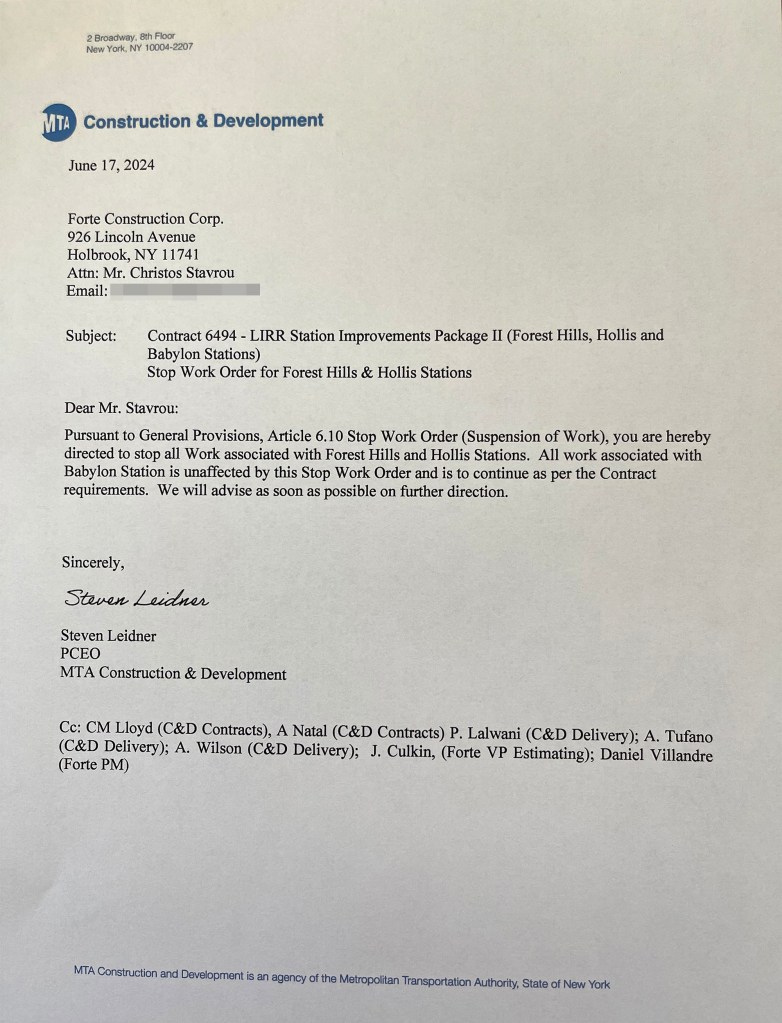MTA halts construction projects in move to ‘scare NYers,’ pressure Hochul after axing congestion toll: sources
Contact The Author
The Metropolitan Transportation Authority has halted construction projects at two Queens rail stations to put pressure on Gov. Kathy Hochul after she knocked down the unpopular congestion pricing plan, sources said.
The MTA sent a letter ordering a contractor to immediately suspend work on making its Long Island Railroad stations in Forest Hills and Hollis more accessible to riders with disabilities – a move that some view as a push for Hochul to restore congrestion pricing or find another revenue source for its capital spending program.
“You are hereby directed to stop all work associated with the Forest Hills and Hollis Stations,” MTA capital construction CEO Steven Leidner said in a June 17 letter to the head of Forte Construction, obtained by The Post.
The MTA anticipated generating $1 billion in revenues a year from the congestion toll to help finance $15 billion capital repairs, maintenance upkeep and system expansion.
The controversial $15 “congestion” imposed on drivers to enter Midtown south of 60th Street was scheduled to go into effect June 30 – but Hochul shelved the program before it ever went into effect, expressing concerns about the economic impact in post-COVID New York.
Forte, the construction firm, was not happy about having to stop work on the LIRR projects to comply with the federal Americans with Disabilities Act.
“It is understood that the stop work order is a result of lack of funding due to the pause in congestion pricing,” said Forte spokesman Tom Butler.
“The decision not only delays the necessary station improvements but jeopardizes the many construction jobs depending on this project.”
But opponents said the MTA putting the brakes on the projects shows the congrestion toll was a money grab and was never about reducing congestion.
“The MTA is an entity that answers to no one. The transit officials think they run their own fiefdom,” said Kathryn Freed, a retired judge and councilwoman from the Lower East Side, and co-founder of Keep NYC Congestion Tax Free.
Freed, a plaintiff in one of several lawsuits contesting congestion pricing, said the MTA’s problem is rampant spending and that transit officials should stop blaming others for its money woes.
The authority has faced ongoing scrutiny for billions of dollars in cost overruns to build new subway tracks – and for losing $700 million a year from fare beating.
“Why do so many transit systems in the world work better? Why isn’t the MTA more efficient?”
Staten Island Borough President Vito Fossella, a congestion toll opponent, said, “This is a time for reflection. Are there ways to reduce costs for capital projects instead of thinking you’re going to get a blank check?”
Councilman Joe Borelli (R-Staten Island) said the MTA should stop the “gamesmanship.”
Noting that Hochul appointed MTA CEO Janno Lieber, Borelli said, “The governor should tell them to do what they’re f–king told.”
MTA officials are expected to outline “cuts” to the capital program during meetings this week, saying they can’t move forward on projects without additional funds.
Jamie Torres-Springer, the MTA’s construction and development president, said last week that “we have stopped work on the Second Avenue subway [expansion].”
The $7.7 billion phase two leg of the Second Avenue subway would add three new stations – extending the Q line into East Harlem and connecting to Metro-North and the No. 4, 5 and 6 trains.
“There are a lot of projects we will not be able to build,” said Torres-Springer, emphasizing the agency will focus on the basics of keeping the current system in “good repair” rather than on expansion.
“We have in a couple of cases issued stop work orders for projects that do not strictly meet the ‘good state of repair’ requirements.
“There will be implications all across the capital program,” he said.
Transit sources said the MTA’s decision to spell out cuts – before Hochul and the legislature have a chance to reach an agreement on alternative financing for the agency or identifying savings in the agency – amounted to a mutiny.
“Governor Hochul has stated repeatedly that she is committed to funding the MTA and is working with partners in government on funding mechanisms while congestion pricing is paused,” said Hochul spokesman Anthony Hogrebe.
Get all the stories that move New York to your inbox
Sign up for our Metro Daily newsletter!
Thanks for signing up!
Another Albany insider suggested the MTA should stop the hysterics.
“The MTA knows that there’s no way the governor and legislature don’t deliver funding for their capital plan. And most of these projects are years away from being started, let alone completed,” the source said.
“They’re just playing games and trying to scare New Yorkers to put pressure behind congestion pricing rather than coming up with alternative ideas and finding ways to save money.”
Transit advocates sided with the MTA, saying it was Hochul who has created the mess by “pausing” the congestion toll.
“This is a manufactured crisis we didn’t need to have,” said Lisa Daglian, head of the Permanent Citizens Advisory Council to the MTA.
She said “the safety of the riding public has to be job No. 1” with a pared-down construction program.











